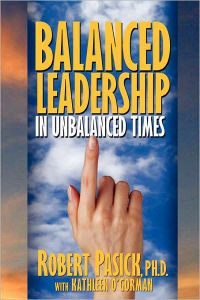I met Rob Pasick years ago, when I was business editor at the Ann Arbor News and he was an interesting local character — a psychologist and executive coach and who was working the media not about his day job but about his book “Conversations with My Old Dog.”
 We’ve stayed in touch off and on over the years, and when he came to New York to visit his son in March, he popped by my office and gave me a copy of his latest book, “Balanced Leadership in Unbalanced Times.”
We’ve stayed in touch off and on over the years, and when he came to New York to visit his son in March, he popped by my office and gave me a copy of his latest book, “Balanced Leadership in Unbalanced Times.”
Since I have a habit of reading several books at a time, I finally finished Balanced Leadership recently. It takes a broad view of balance — speaking to the macro situation of the recession as well as the micro balancing act of juggling career and personal life.
Rob starts his book by saying that:
The aspiring leaders I’ve worked with for some three decades have taught me many things, but these are two of the most important:
- Great leaders constantly strike a balance between work and the other realms of their lives.
- Great leaders share a passion: they want to make a difference in the world.
He lists principles of a balanced leader that include balancing your needs with those of others in your organization, managing your time and energy, recognizing and managing your blind spots, acknowledging and learning from your mistakes and maintaining a sense of humor. He also says you must balance your needs with those of others in your family and cultivate friends and relatives who will help keep you on the right path because you cannot achieve any of this alone.
As Rob and I talked about his book and his career, it was clear to me he wasn’t coaching others because he believes he’s perfect. On the contrary, he understands the value of learning from his own mistakes and wants to help others over the same hurdles he’s faced.
He tells a story in Balanced Leadership of bailing out on a family vacation because he got a call to be on Oprah’s show. He writes:
It wasn’t until I returned a few days later that it dawned on me: I was so caught up in my success that I had put my own need for fame ahead of the family’s need for my time.
I also enjoyed this interview on Rob’s Web site, between Rob and his publisher, David Crumm. One highlight:
DAVID: I think one of your most powerful insights is that people tend to place all their emphasis — in anxious times like these especially — on the phase of life that’s probably the one we can adapt most easily, right?
ROB: Right. Our work.
We become so stressed from trying to juggle all these balls that we contribute to this unbalanced situation. We tend to put more and more effort into the one sphere that’s actually the most replaceable: our work.
Think about this. If we let our health collapse, then it’s much more difficult to make any kind of recovery. It’s easier to find another job than to come back after our health has collapsed.
When we get stressed out about work, we also tend to let family lag behind, don’t we? But, I’ll tell you: Finding a new job is easier than going through all the destructive things that happen when we neglect our families. People find themselves drawn toward maybe having an affair. We can wind up facing divorce. If we’ve messed up and we’ve neglected our children, then there may be no way to go back and recover from that. When we’re stressed over work, a lot of people tend to neglect family first — when that’s actually one of the most important spheres in our lives.
Community? That’s also very difficult to restore, if we allow community relationships to fall apart.
And integrity? Get into drinking or addictions and develop behaviors that wind up publicly violating our integrity? That’s very hard to recover from. Much more difficult than finding a new job.
What do you need to work on to give your life better balance? Are you doing anything to achieve that? If not, how could you get started?

